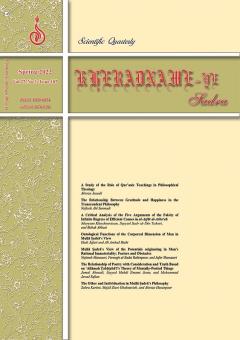The Relationship of Poetry with Consideration and Truth Based on ‘Allāmah Ṭabāṭabā’ī’s Theory of Mentally-Posited Things
Subject Areas :Jamal Ahmadi 1 , Seyyed Mehdi Emami Jume Emami Jume 2 , Mohammad Javad Safian 3
1 - PhD candidate of Transcendent Philosophy, University of Isfahan, Isfahan, Iran
2 - Associate Professor, Islamic Philosophy and Kalam Department, University of Isfahan, Isfahan, Iran
3 - Associate Professor, Philosophy Department, University of Isfahan, Isfahan, Iran
Keywords: theory of mentally-posited things, poetry, positedness, art, truth, language, ‘Allāmah Ṭabāṭabā’,
Abstract :
In ‘Allāmah Ṭabāṭabā’ī’s view, poetry and mentally-posited perceptions have such a close relationship with each other that he describes such perceptions through using poetic similes, allegories, and metaphors in his book of The Principles of Philosophy and the Method of Realism. This study explores the relationship between poetry and mentally-posited perceptions through referring to those works of ‘Allāmah Ṭabāṭabā’ī in which he discusses the theory of mentally-posited things. The significance of this relationship lies in the fact that, by investigating the relationship between these two variables in different philosophical, gnostic, and interpretive works of ‘Allāmah, one can inquire about the relationship of poetry and positedness with fact-itself truth. The findings of this study indicate that mentally-posited things are the same as Man’s poetic view of the world or an eye with which Man can see everything. This poetic world, while being irrational and non-inferential, can speak of truth through allusions. Accordingly, it can be claimed that the theory of mentally-posited perceptions in Islamic philosophy has opened a new window to attaining the knowledge of truth.
قرآن كريم.
احمدي، بابك (1389) حقيقت و زيبايي، تهران: مركز.
حسيني، عفت السادات؛ ضياءشهابي، پرويز؛ جوادي، محسن (1398) «پژوهشي پيرامون هنر از حيث اعتباري بودن بر اساس نظرية اعتباريات علامه سيد محمدحسين طباطبايي»، فلسفه و كلام اسلامي، شمارة 18، ص228207.
ريكور، پل (1395) زندگي در دنياي متن، ترجمة بابك احمدي، تهران: مركز.
سلگي، فاطمه (1394) «تحليل هستي شناختي نظريه ادراكات اعتباري علامه طباطبايي»، حكمت صدرايي، سال سوم، شمارة 1، ص68 55.
صافيان، محمدجواد (1396) ياد و خاطره نزد حافظ و هيدگر، تهران: نقد فرهنگ.
طباطبايي، سيدمحمدحسين (1374) الميزان في التفسير القرآن، ترجمه سيدمحمدباقر موسوي همداني، قم: جامعة مدرسين حوزه علميه قم.
طباطبايي، سيدمحمدحسين (1388) انسان از آغاز تا انجام، ترجمه صادق لاريجاني، قم: بوستان كتاب.
طباطبايي، سيدمحمدحسين (1392الف) اصول فلسفه و روش رئاليسم، مقدمه و پاورقي مرتضي مطهري، تهران: صدرا.
طباطبايي، سيدمحمدحسين (1392ب) «رسالةالولايه» در: مجموعه رسائل علامهطباطبايي، ج2، بكوشش سيد هادي خسروشاهي، قم: بوستان كتاب.
طباطبايي، سيدمحمدحسين (بيتا) «رسالة الاعتباريات»، در: مجموعه رسائل العلامهالطباطبايي، قم: باقيات.
قائمينيا، عليرضا؛ اميني، مهدي (1393) «تبيين زيبايي بعنوان مفهوم ثاني فلسفي از ديدگاه علامه طباطبايي»، ذهن، شماره» 58، ص10081.
كوكلمانس، يوزف (1388) هيدگر و هنر، ترجمه محمدجواد صافيان، تهران: پرسش.
گادامر، هانس گئورگ (1399) «درباره اداي سهم شعر در جستجوي حقيقت» در: هنر و زبان، ترجمه مهدي فيضي، تهران: شبخيز.
مصلح، علياصغر (1392) ادراكات اعتباري علامهطباطبايي و فلسفة فرهنگ، تهران: روزگار نو.
ميرحسيني، سيدامين؛ سيف، سيدمسعود؛ حساميفر، عبدالرزاق؛ فتحطاهري، علي (1398) «هستيشناسي اعتباريات، اعتبار بمثابه نحوه هستي انسان در جهان مادي»، خردنامه صدرا، شمارة 98، ص 7463.
وليدي، شهرام؛ سهيل، كيان (1389) «وابستگي متقابل قدرت و استعاره، رويكرد فوكويي دريدايي»، نقد زبان و ادبيات خارجي، پاييز و زمستان 89، دوره سوم، شمارة 5، ص122104.
يزداني مقدم، احمدرضا (1396) «كاربرد و توجيه نظرية ادراكات اعتباري در تفسير الميزان، يك تحليل مقايسهاي»، فصلنامه حكمت اسلامي، سال چهارم، شمارة 1، ص5031.
Heidegger, Martin (1971). »poetically man dwells«, poetry, language, thought, translated by Albert Hofstadter, Newyork: Harper and Row, pp 213-229.
Ricoeur, paul (1978). »The Metaphorical Process as Cognition,Imagination, and Feeling«, Chicago Journal , Vol. 5, No. 1, Chicago: Critical Inquiry, pp. 143-159.
Ricoeur, paul (2003). The Rule of Metaphor ,translated by Robert Czerny with Kathleen McLaughlin and John Costello, Londen and Newyork: Routledge.


